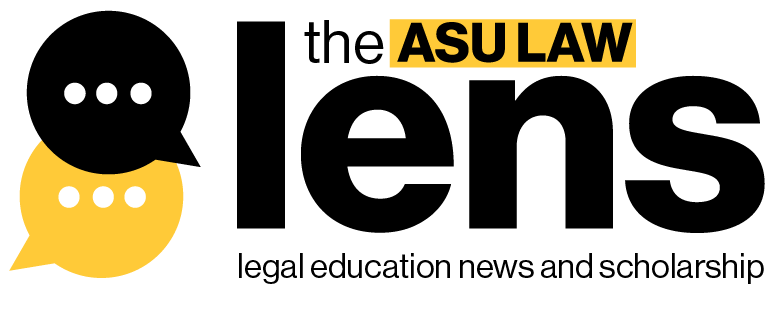
American Indian Policy Institute and National Congress of American Indians launch the Center for Tribal Digital Sovereignty
Today, the American Indian Policy Institute (AIPI) at the Sandra Day O’Connor College of Law at Arizona State University and the National Congress of American Indians (NCAI) announced the launch of the Center for Tribal Digital Sovereignty, the first and only center in the nation dedicated to providing Tribal governments leadership and communities with the resources and support needed to establish a digital sovereignty plan. This groundbreaking partnership, revealed during the NCAI 2024 Mid Year Convention & Marketplace, marks a significant milestone in supporting Tribal Nations in navigating the complexities of digital sovereignty.
"Tribal Digital Sovereignty includes both the information and the physical means by which it transfers— it is governance, it is economic, it is self-determination. We're looking forward to working with our partners at NCAI in serving Tribal Nations as we navigate this new platform together,” said Dr. Traci Morris, executive director of the American Indian Policy Institute and research professor at ASU Law. “With the launch of the center, Tribal Nations will have the resources they need to build their own individual proactive digital sovereignty plans.”
Digital sovereignty encompasses all aspects of a Tribal Nation's digital plan and footprint, such as Tribal codes, managing data protection, digital equity, network infrastructure, development of funding sources and capacity building.
“Broadband and other communications technologies are the 21st Century platform for Tribal self-determination. The establishment of the Center for Tribal Digital Sovereignty is a major turning point,” said Geoffrey Blackwell, NCAI general counsel and chief of staff. “Tribal livelihood is either empowered or ignored every day by various technologies and the related laws and policies. We are excited to partner with ASU to empower Tribal Nations with the analysis, scholarship, advocacy and resources needed to develop their digital environments and exercise their sovereign rights while embracing technological advancements.”
There is no single Tribal Digital Sovereignty plan that fits the unique needs of all 574 federally recognized Tribal Nations and no central resource network for managing their digital footprint. The Center for Tribal Digital Sovereignty will offer comprehensive expertise and a clearinghouse of information to support Tribal Nations in developing personalized digital sovereignty plans with long-term solutions.
"This is a landmark moment. Digital sovereignty is essential for advancing the priorities of Tribal Nations and their cultural integrity in the digital age," said NCAI President Mark Macarro. "This partnership represents a powerful alliance that will allow Tribal Nations to navigate and shape our futures with confidence and autonomy. The Center will also provide the basis for building a new coalition of trusted organizations with proven track records to provide additional services and support to Tribal Nations. This initiative offers us the necessary tools and knowledge to secure our digital self-determination and ensure that our sovereignty is respected.”
The Center for Tribal Digital Sovereignty provides research and scholarship, capacity-building support and will form a coalition of expert community-serving organizations with long histories of working in this space, creating a gravitas of service as an open-source information resource and clearinghouse for Tribal Nations on Tribal Digital Sovereignty planning. With initial seed funding from the Ford Foundation and Google.org, the Center for Tribal Digital Sovereignty will form a coalition of organizations and entities that have been invited through a review process. Membership in the coalition will be determined based on alignment with the core values of the American Indian Policy Institute and the National Congress of American Indians – which are to serve Tribal Nations, advance Tribal sovereignty and remain neutral with regard to Tribal network and technology choices.
“At ASU Law, we're excited to amplify the work of the American Indian Policy Institute and the National Congress of American Indians as we launch the Center for Tribal Digital Sovereignty,” said ASU Law Willard H. Pedrick Dean and Regents Professor of Law Stacy Leeds. “This initiative not only exemplifies our commitment to supporting Indigenous communities but also underscores our belief in the power of collaboration to drive meaningful change. Together, we're forging a path forward that empowers Tribal Nations to navigate the digital frontier with confidence, ensuring their sovereignty and cultural integrity endure and thrive in the digital age.”
The Center will serve as the coalition’s administrative hub and central point of contact, in addition to providing advocacy support and service to Indian Country that is free and accurate, convening coalitions and hosting conferences. The coalition will include Tribal organizations, policymakers, researchers, educators and leaders with long-term engagement in Tribal digital sovereignty-related matters. NCAI's involvement will include advancing policies through its 80 years of advocacy, providing foundational funding and developing sustainable funding models.
To further bolster its mission and impact, the Center is actively seeking support from foundations and partners committed to advancing Tribal sovereignty and digital equity. Interested philanthropic partners are invited to reach out to the NCAI Foundation or the ASU Foundation.
Written by Kourtney Kelley
Stephen Breyer, associate justice of the U.S. Supreme Court from 1994 to 2022, has been named the 2026 recipient of the O’Connor Justice Prize.
Related links
For the media
Legal studies research
Legal experts list
Media resources
Faculty directory
Staff directory
For all press and media inquiries, please contact: Kourtney Kelley, Assistant Director of Communications
[email protected]
480-965-6197
-
Newsroom homepage
-
LENS Newsletter
-
ASU Law Talks
